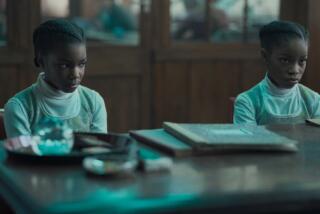Book review: ‘Twin’ by Allen Shawn
Shortly after his mother’s death at 99 in 2005, Allen Shawn — the son of legendary New Yorker editor William Shawn and brother of actor and playwright Wallace Shawn — began writing “Wish I Could Be There,” a book about phobias grounded in his firsthand experience. To his surprise, his autistic twin sister, Mary, who had been institutionalized since they were 8 and marginalized in his day-to-day existence for decades, emerged as a central figure in his life story.
A composer and music professor at Bennington College in Vermont, Shawn is equally unflinching and compelling in “Twin,” which shifts the focus from phobias to twins, autism and what used to be called mental retardation but is now called by some medical professionals “intellectual disability.” He again effectively interweaves research and analysis with personal reminiscence, exploring the ways in which his development and his sister’s intertwined, diverged and “unfolded on parallel tracks.” He contrasts Mary’s life in a large custodial institution in Delaware and her evolving diagnoses (both autism and schizo-affective disorder) with his evolution as a composer and his education in Manhattan, Vermont, at Harvard and in Paris. Composing — and now writing — have provided a way for him not so much to express as to “excavate” his inner world.
There is considerable repetition between both of Shawn’s books, including specific incidents, such as his father’s enigmatic admonition after 6-year-old Shawn was caught comparing genitals with a female playmate. (“‘There was nothing wrong with what you did,’ he said, ‘we just don’t do it.’ ”) “Twin” offers a fuller picture of the family dynamic, including Wallace’s role as a refreshingly iconoclastic and amazingly devoted older brother.
Shawn returns repeatedly to Mary’s institutionalization in 1957, examining it from multiple angles and trying to understand his parents’ decision. This haunting theme runs like a plaintive musical refrain through both memoirs. In the space of a few years, he and Mary moved from sharing a room and a childhood to seeing each other at most twice a year, “with our twinship almost a taboo subject.” It was, he says, “like an unmourned death.” Not surprisingly, Mary’s departure left him feeling guilty at having been “spared,” and “wondering if it was only a matter of time before the magic glue that held my own brain together would lose its adhesive properties” and he too would be sent away.
“The problem of Mary’s sudden departure for me,” he adds, “was that it never seemed like a rescue but only a punishment: an expulsion, an exile. To me there was nothing wrong with Mary.”
Although Shawn never doubts his parents’ good intentions, he doesn’t refrain from exploring the context in which their decision was made — an analysis clearly enriched by years of psychotherapy. In particular, he examines the “contradictory sexual messages of our household,” which included his mother’s “overflowing romantic feelings for our father, contrasted with her nervous, cautionary words about sex,” and his father’s primness, contrasted with his 40-year affair with New Yorker writer Lillian Ross.
Shawn, born in 1948, learned when he was 30 that his highly sensitive, phobic father had been living a double life with a second mate since 1952 — with his mother’s knowledge but not enthusiasm. He avoids naming Ross in his book, although the relationship has been public knowledge since she published her memoir, “Here but Not Here,” in 1998, six years after William Shawn’s death but while his widow, Cecille, was still alive.
Ross portrayed Cecille as the woman William Shawn stayed with out of dutiful loyalty and love for his children. Now, Shawn the son comes to his mother’s defense in “Twin.”
“No one could say that their rapport was cheerless and cold,” he writes about his parents’ affectionate relationship. He describes several frank conversations with his father, who explained that “there were two women he could not live without.”
With typical understatement, the author comments, “no one in our family could have ever passed for ‘normal.’” “Twin” movingly conveys the solace of reconnecting with his lost sister and of delving into “how people bear and express the imprints left on them by others.” But its most impressive achievement is to showcase the richness afforded by what Shawn calls an “expanded sense of the human spectrum.”
McAlpin reviews books regularly for NPR.org and other publications.
More to Read
The biggest entertainment stories
Get our big stories about Hollywood, film, television, music, arts, culture and more right in your inbox as soon as they publish.
You may occasionally receive promotional content from the Los Angeles Times.










